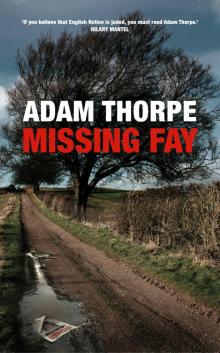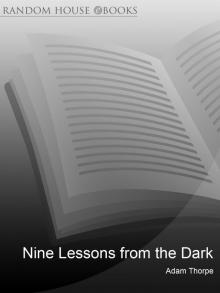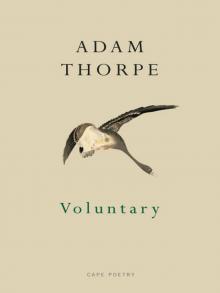- Home
- Adam Thorpe
The Standing Pool Page 23
The Standing Pool Read online
Page 23
Pause. He would pay for that tonight.
‘Go away, Daddy,’ came the confident order through the door. ‘I don’t care. Anyway, I’m parcel deaf.’
‘Where the heck did you get that idea from? Hm? What are you doing? Are you going to be long?’
‘Say please.’
‘Please.’
Then there was silence. Tammy kept mum. Her father paced up and down for at least ten minutes. The only signal in the entire house was that spot below the ceiling in the bathroom, seven feet up, between the loo and the basin. At six feet it was dodgy. But at seven feet it was clear.
‘Alicia, I’m going to explode.’
Some clinking noises issued from the bathroom, then nothing. Sarah was on the stairs. ‘Have you got through, Nick?’
‘I haven’t even managed to get into the bloody bathroom!’
‘There’s no point in getting annoyed with me,’ Sarah complained, her face returning to the point of anguish in which they’d found it an hour ago. Already an hour!
‘I’m not annoyed with you, I’m annoyed with that incredibly selfish girl in there!’
Sarah talked through the bathroom door. ‘Alicia darling, Daddy needs to phone Jean-Luc about the electricity right now. Could you open the door, please, sweetie-pie?’
The door opened and Alicia emerged with sparkly eyelids and lips, rouged cheeks and a ribbon in her hair. She walked straight past them and into the bedroom and started talking animatedly – presumably to herself or to one of her cuddly toys, because Beans was now present, holding Tammy’s hand. Sarah said, ‘There you are. It’s called negotiation.’
‘Jesus Christ,’ he said. ‘It’s called being in a state of denial, that’s what it’s called. Dancing on the deck of the Titanic.’
He stood on the chair in the bathroom and knocked his head on the beam and said fuck several times. Jean-Luc wasn’t in. Alicia was squealing in her bedroom at something one of her sisters was doing. He felt as if evolution was running backwards inside him, that he was short and thick and snarled a lot. Sarah would be fed up with him for losing his temper. His skull-bone winced from its contact with the iron-hard wood of the beam. Fuck.
Sarah wasn’t fed up: she suggested he go back up and try the gods themselves, in London. Nick did so, and mentioned the flowers being left. It was a probe, but Lucy didn’t react. Or rather, she pretended it was to do with a child dying a hundred years ago. He assumed she was inventing, anyway. He didn’t have the courage to be more direct. After all, she was no doubt covering up for their sakes.
He came back from the bathroom with the deities’ message: phone Jean-Luc. It was a kind of loop tape. He tried every hour, on the hour, taking a candle up when night fell and searching for the numbers in the shadow of his thumb.
‘Still no answer,’ said Nick. ‘Yet again.’ He was standing on the chair in the bathroom’s darkness, tall enough to have to stoop. The mobile’s blue light made his face look artificial, thought Sarah. The wind had got up outside and added to the atmospherics of the lone candle with distant bangings and moanings. ‘I think it’s too late. We shouldn’t have tried again so late. It’s nearly eleven. Then our mobiles will run out and we’ll be stuck forever. I should have driven over to Aubain.’
‘Too many should haves. Anyway, I can’t believe he goes to bed before eleven.’
‘This is the country, Sarah. He hasn’t even got an answer-phone. I’m not trying again. Tammy, what’re you doing here?’
‘You woke me up. I want to stay with you for a bit.’
They went gingerly downstairs and sat in front of the fire, which blustered feebly in response to the wind down the chimney. Tammy was perched on her mother’s lap, although neither of them was very comfortable. The logs hissed, turning black and bubbling sap without producing more flame than the smallest ring on the hob. Smoke puffed into the room. Nick said they’d have to go into the woods to collect heaps of dry stuff, to get the fire really going. They both had sweaters on, but Tammy was fine in her nightgown.
Each day it got colder; the year was going backwards, perhaps, despite the flowers.
The air was really smoky, now. He had reached a compromise of mild grumpiness. It was late – half past eleven. Sarah’s glasses lay on the arm of the sofa like someone contemplating the heavens with their arms folded. The wind was saying sassa, sassa, picked up by the chimney. Amplified. Knocking noises.
‘Maybe we should all go to bed,’ Sarah said, tapping her daughter on the back.
Who coughed and sounded impressively consumptive, exaggerating the rattle and prolonging each cough until her mother, hand on her back, suggested she stop.
Lucy Sandler’s advice, when she took the call from the annoyingly helpless couple in Les Fosses, was to contact Jean-Luc. Otherwise an electrician, but of course she didn’t have any numbers here. There was an okay electrician in Valdaron, but the one in Aubain was useless; she couldn’t recall his name. Yes, he would have to wait until tomorrow if Jean-Luc was still no joy, but since mankind had done without electricity for thousands of years then one more day wouldn’t threaten their survival, she didn’t think –and laughed to take the edge off. Horribly, there was a delayed echo and she heard her own laugh come back at her faintly.
‘Millions,’ said the voice at the other end. ‘Millions of years.’
She asked again if he’d pressed the black button or the red or whichever it was and he said yes, it was not a storm but the damp. It had been misty. She pointed out that a storm could have happened miles away and hit a main thingie, it was one of the inevitable drawbacks about living in rural France, their electricity system used some method peculiar to them and was not up to scratch and you couldn’t tell them anything, they’d rather die than learn from the Brits, it was the same when they’d pulled out of NATO, they had to be different and superior, Alan knew all about it but he was out.
In fact, she was looking at Alan as she spoke, but he had received a death-threat by the ordinary post that morning, made up of words cut out of a newspaper, and had drunk too much as a result. He was ugly, today. He was onto his ninth whisky and zapping through rubbish on cable. She heard the ends of her sentences like someone teasing her: her voice sounded ghastly, high and affected.
She asked the professor how the lawn was getting on.
‘Fantastic,’ he said. Which was an odd reply. ‘And the cherry tree’s fine.’
She wondered if they were enjoying themselves, otherwise. Oh yes, he replied, none too convincingly.
But she groaned inwardly at the thought of five more months to go. The whole point had been to forget the blasted place. If Alan hadn’t stuffed one of its cellars full of his blasted Iraqi art – stuffed was not quite the right word, since it was only a single metal crate with a label saying BOOKS – she’d have been very tempted to sell the wretched house. She had suggested a Swiss bank vault, but of course you couldn’t even trust a Swiss bank these days: they were onto the police just like that, it was the latest fashion. There was that big Nazi haul of Impressionist paintings that had just been unlocked. Nowhere was safe. You had to go DIY, these days. Bury the treasure. Yo ho ho and a bottle of rum. At least it wasn’t drugs.
The professor was going through what they’d done, and she was making the right noises, although she hadn’t taken in a word, it was utter tedium, the usual stuff about the marvellous vegetables in the marvellous bloody markets, but the conversation then took a peculiar turn.
‘By the way, someone put some memorial flowers against the house two or three weeks ago,’ he said. ‘Any idea why?’
She felt a sharp tear in her nervous system, all over. She said something about a child’s tragic death a hundred years or so ago, how tenacious these peasants were at remembering, how important family was, and so on. Even that was a bit risky: why had she invented a child dying? She gave herself the shivers, just saying it.
‘Must have been a special child,’ he said, in that dry, half-mocking way his sort cultivated.
‘Much loved, that’s all.’
Which she thought would squash him. But after a little pause he bounced up again, wondering if anything had happened in the house, it seemed to have a totally undeserved reputation. Lucy felt an iciness creep up her back and she had to take a deep breath.
‘Nothing’s happened in the house that I know of,’ she said. ‘I’ve always found it a very happy place. But I can’t speak for before we got it.’
She regretted this immediately. ‘Got it,’ said the echo, before he replied. They would be bound to find out about that poor man sooner or later. Why was she hiding it? She wanted to backtrack, to tell him about the wretched builder falling off the wet roof, but he was already saying goodbye. She put the phone down on the snow-white arm of the chair and felt very unhappy.
‘Well,’ said Alan, shaking the ice in his tumbler, ‘I guarantee that’s got him confused.’
The television was on mute, showing a man blowing glass somewhere Scandinavian, from the look of it.
‘I thought the whole point was not to have to worry about it,’ she said. Her chest was a cavern full of bats.
‘The whole point was to occupy the place,’ Alan murmured. ‘Empty houses get unwelcome visitors.’
What, she thought, if the unwelcome visitors are already in situ?
‘Maybe we should retire early to New Zealand or somewhere,’ she said, not really meaning it. ‘Though they say it’s terribly philistine.’
Alan stirred and looked at her for a moment, his eyes almost regaining the blue lustre that had so attracted her once. ‘Now that, Lucy, is the best idea you’ve had in a very, very long time.’
Sarah woke up, startled, unsure where she was until she surfaced. Her bedside light was on. There was a faint, manic sound of laughter from downstairs. She had no idea of the time and looked at her watch on the bedside table. 3.22. Ugh. The laughter frightened her, especially when it subsided into a muttering. She didn’t remember switching her light on.
Nick was on his back, snoring gently. She preferred not to look at him like that, and slid out of bed to find she was stepping on Beans, who didn’t seem to notice, her little form curled in a welter of sheet and blanket. Then Sarah remembered. The electricity had gone and the girls could only sleep with the shutters open to the stars and a sliver of moon, the suggestion of light entering their room like vapour. She wasn’t keen on lighting a night-light, but Nick had put one into a jam-jar and it quivered in the corner. If it was precariously enough for Tammy and Alicia, it wasn’t enough for Beans.
Now the electricity had come back on, by itself, or as if someone else was in charge. The noises downstairs were, she realised, the telly. One of the girls must have switched it on after the power-cut, forgetting. She padded downstairs to find the room constantly flickering in the telly’s blueish light.
Bleary from sleep, she didn’t spot Tammy at first. Her daughter was sitting on the sofa like a Buddha, blue-faced, legs curled up under her, staring at the screen that flickered white in her eyes. It was mostly snow, with dim shapes moving and laughing in the blizzard, the occasional close-up of a face through misted glass.
‘Tammy, you should be in bed.’
‘Can’t sleep.’
‘Why?’
‘Cos lots of things are putting together in my head,’ she said, eyelids blinking slowly.
‘What things, darling?’
‘Like motorbikes and French angry things and Alicia’s being really annoying. I want to go home.’
Sarah felt a lead weight of dismay sink through her. She sat on the sofa and put her arm around her daughter, who immediately nestled in the crook of her waist.
‘It’s so nice being here; it’s very special,’ she whispered, as if persuading herself.
The morning was bright after the wind, and she had to put sunglasses on. The air was hardly warm, but the sun certainly was – she was very aware of it as a heavenly body, a physical entity with tongues of flame licking her skin; she wondered whether to begin to apply cream on the kids. The miniature clothes were pegged up one by one yet again, coming round so often she wondered whether the days had slid into each other, a temporal pile-up. Ladybirds, teddy bears, wizards.
She walked round to the back of the house as she always did after hanging the clothes and received a shock. The chicken-wire fence around the Zone had been pulled down all along one side, the side facing the barn. The boars had rotivated the seed-bed so thoroughly it made her want to laugh. The little cherry tree leaned at an angle, its roots exposed. It was as if they’d been visited by an English stag party.
She stood by the swimming pool and stared into it. Jean-Luc had certainly cleaned up the troubled waters; the bottom was waveringly visible, the filtering system purred, the surface had a silky vibration to it at one end. Nick had tested the pH levels yesterday and they were fine, to his delight.
She dipped her fingers in and was surprised by the cold. A brisk morning swim each day, that would be nice: but then the girls would want to and that would be complicated. Unless it was her secret thing. Her little vice.
Maybe it was too clean, now; she hadn’t thought of this before. She’d almost preferred its greenness, its murk, in which the toad and various slimy plant-forms lurked. Then Jean-Luc had come along and poured his chemicals in, like an unthinking scientist, like all those unthinking scientists who dreamed up pesticides and everything else disastrous. A chlorine smell tinted the air around it, now. Sarah almost resented Jean-Luc for this: something no one else would understand.
When her father had been based for a few months in Aden, Sarah and her mother joined him, and the officers’ pool was theirs. The officers hardly used it, although it had been made for them in 1973: the date was marked in the cement surround, with a heart around it, which made the cement seem still wet. The pool was surrounded by a flimsy rush fence and the water was full of frogs and huge drowned insects, a dark mantle she’d swim through, keeping her mouth shut, not thinking twice about it. She was only ten, but she loved it. She thought it was paradise. She sometimes found insects still struggling, and saved them. Even locusts. She couldn’t see her feet in the murk, but felt the frogs nibble them. She assumed it was the frogs. The pool turned into a kingdom full of stories, of which she was the queen. She was surprised now that she hadn’t fallen ill with some water-borne disease, but all she came down with was some type of whooping cough. Her mother had seemed very relaxed about it all; she’d let her daughter play alone by the pool for hours, not even bothering with sun-cream. Neglect, really. Then along she would come with a towel, smelling sweetly of drink, and lower herself in, wrinkling her saggy face under its flowery plastic cap, sweeping the insects from her so that the mantle darkened in a clear radius around her body.
‘Dutch courage,’ she’d always say, giggling, then launch herself forwards and swim two clumsy lengths, chin held high, eyes almost closed. Her daughter would laugh and feel pleased: her father would never swim in the officers’ pool.
Now she felt almost sorry for her children, having only this sterility. She rocked the surface with her hand, sending out ripples that made the filters cluck and gobble. Almost a loud noise in this stillness, this held breath of the place.
The hunt came two days later, just after dawn, very much like Odin’s bursting into Midgard.
A murmur of engines and shouts and tinkly bells, then a gunshot, very loud. Then another. Tammy was already awake, though tired. Beans started crying, joined by Alicia, calling out for Mummy. The darkness was still total in their bedroom except for a pencil-line of light either side of the window where the shutters didn’t quite meet the wall at the hinges.
‘Help,’ Tammy whispered. ‘I think it’s the terrorists.’
Seven gunshots. Seven was enough.
They were all in their parents’ bedroom within a minute. They stayed with their mother in bed while their father opened the shutters gingerly, because there were still voices below. He could see two men in fluorescent
orange caps and with guns on their backs, chatting below. Another was peering over the drop to the first terrace. A huge, silvery four-by-four was parked crookedly in front of their car, as if to stop it getting away.
Their car had shrunk into itself, just as Nick did when one of the hunters glanced up. The hunter didn’t wave, or laugh, or look surprised. Instead, he simply ignored Nick. The man’s stubbled face returned to its former position, and carried on chatting.
‘Just to confirm. It’s the hunters,’ Nick said, blearily, closing the window but leaving the shutter slightly open. ‘Complete with hell-hounds. And they are not in the slightest bit bovvered, by the way.’
The room was dusted over with the grey morning light, reassuring them.
‘Didn’t you say anything?’ asked Sarah.
‘Did you hear me say anything?’
‘No.’
‘Then why ask?’
‘They can’t be allowed to hunt in someone’s garden. They were shooting in our garden.’
‘It’s not our garden. There was no point in me saying anything.’
‘You know what I mean. It’s private property.’
‘Fox-hunters follow the fox wherever.’
Sarah didn’t reply, cuddling Alicia and Beans. Tammy was too sleepy to contribute.
‘Someone must have told them about the preponderance of boars,’ said Nick, now reduced to the very edge of the bed.
‘Boars deaded,’ said Beans, still shuddering slightly.
‘Sssh. I’m asleep, please,’ said Alicia.
Once properly up, Nick evinced a sudden burst of energy, the type that hits everybody from time to time and in which an amazing amount can be done – houses cleaned from top to bottom, gardens dug over, curtains whipped off the rails and seamed into ball-gowns, revolutions sparked, the planet saved, the glaciers thickening up again and millions of creatures pulled back from extinction.
He fashioned signs. Three, to be precise. He was no carpenter, but a righteous anger gave him a sudden facility, the pieces of wood and the tools leaping into his hands and the black paint appearing out of the darkness in the first cellar he tried, and still usable through a rubbery skin. He was ‘on a roll’ (as he put it) all morning, and hammered the signs to trees on the track where, from the old map of the property, he’d identified the remains of a smothered stone wall as the unmarked edge of the Sandlers’ land. The hammering echoed through the woods.

 Missing Fay
Missing Fay Hodd
Hodd Pieces of Light
Pieces of Light The Standing Pool
The Standing Pool Ulverton
Ulverton Nine Lessons From the Dark
Nine Lessons From the Dark Flight
Flight The Rules of Perspective
The Rules of Perspective From the Neanderthal
From the Neanderthal Is This the Way You Said?
Is This the Way You Said? Still
Still No Telling
No Telling Voluntary
Voluntary Between Each Breath
Between Each Breath